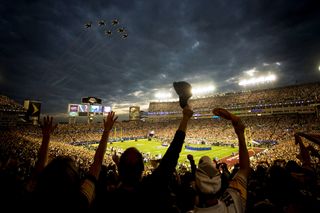Sex
The Super Bowl and Sex Trafficking
Why the Super Bowl sees a major spike in trafficking and what to look out for.
Posted February 3, 2017 Reviewed by Jessica Schrader

Super Bowl Sunday is around the corner. For many, the Super Bowl brings to mind beer, chips, and chicken wings, big-budget ads, and friends fanned around a flat-screen. I’m guessing most people don’t think about the major spikes in sex trafficking that accompany the showdown.
“The Super Bowl is the greatest show on Earth, but it also has an ugly underbelly,” former Texas Attorney General Greg Abbott told USA Today in 2011. “It’s commonly known as the single largest human trafficking incident in the United States.”
The mayor and top police in Houston, this year’s Super Bowl host, have acknowledged the problem that accompanies the weekend partying on America’s favorite Sunday. In mid-January, these leaders in Houston said that they would be cracking down on the sex trade leading up to the big event and will be instituting a zero-tolerance policy on human trafficking for the Super Bowl and thereafter.
Despite law enforcement’s recognition of this issue, the NFL maintains its denial of the correlation between their highest-grossing event and increased levels of sex trafficking activity. NFL spokespeople repeatedly have called the connection an urban legend, pointing to a lack of evidence that arrests for trafficking increase with the descent of thousands of Super Bowl fans into the host city. But that position is misguided. The underground nature of trafficking means that much of the activity goes undocumented but that doesn’t mean it doesn’t exist. This serious societal problem is too important to refute or ignore because of stubborn denials or a lack of data.
One aspect of our culture that very few will deny is a pervasive “boys will be boys” attitude. This position values male sexual prowess and excuses men for behaving badly.
The vast numbers of men who converge on the Super Bowl host city each year in groups are met with a celebratory, party atmosphere, often fueled by alcohol. Given this, it’s not particularly surprising that the Houston police force is preparing for a surge in sex trafficking. After all, sex trafficking is a business and traffickers want to go where the action is. But law enforcement is invariably stretched thin and maintaining order and public safety is the primary concern. It is virtually impossible for them to give investigating sex trafficking the focus it deserves.
Given the realities law enforcement agencies face, the sparse reporting and prosecution of sex trafficking crimes, and the denial of the NFL and other professional sports organizations, disrupting the association between sex trafficking and major sporting events can feel like an impossible task. But there are important steps that can be taken.
First: the NFL and other major sports organizations should admit that this is a problem. If they’re willing to acknowledge the issue, they could play an instrumental role in raising awareness and being part of the solution instead of part of the problem. They are well-positioned to disseminate PSAs and other information to help educate fans about what trafficking is and what can be done about it. Secondly, we need federal, state, and city governments to devote more resources to investigating sex trafficking, and to document its prevalence and consequences. Starting with a firm foundation of evidence would help to establish a consensus about where we need to go from here.
Finally, we must educate the general public on how to identify signs of trafficking (i.e., multiple women—especially women coming from outside of the local area—being controlled by one man) so we can report suspicious activities to authorities. In particular, educating people who work in airports, hotels, and other parts of the hospitality industry is needed so that people who are most likely to come into contact with trafficking victims are aware of how to recognize potential victims and report suspicious activities that may otherwise go unnoticed.
This complicated issue presents us with a choice: We can see the current debate around the Super Bowl and sex trafficking as overwhelming- too widespread, sinister, and nebulous to fix. Or, we can see it as an opportunity to do more- more investigation to understand the scope of the problem, more to catch and stop traffickers, and more to educate the public about how to recognize warning signs. Let’s choose the latter as the winner this year.
I am an assistant professor of global health at the University of Southern California.


